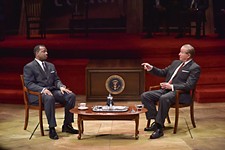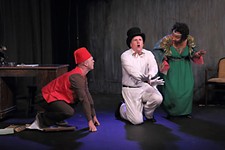A Christmas Carol Roasting on an Open Fire
In A Christmas Carol Roasting on an Open Fire, Rob Nash adds a clever curve to the holiday tale, matching Hollywood stars with Dickens' familiar characters
Reviewed by Robert Faires, Fri., Dec. 24, 2004

A Christmas Carol Roasting on an Open Fire
The Vortex, through Jan. 2Running Time: 1 hr, 10 min
"If they would rather die, they had better do it and decrease the surplus population." The words are the same as they have always been, the same harsh words dispensed by a pitiless Scrooge to the gentleman seeking a charitable donation for the poor, the same words we've heard reeled off by Scrooges without number in countless versions of A Christmas Carol, only this time they're voiced in the haughty, singsong manner we know so well from Jezebel and The Little Foxes and All About Eve. It can be no one else but Bette Davis ... as Scrooge! The notion is outlandish enough to make us laugh, and yet it also feels right somehow. This screen queen, who could be so imperious, so dismissive, so ruthless, would have made an ideal Scrooge, if she'd ever had the chance to play the part.
Well, this Christmas Rob Nash gives her that chance – and gives another two dozen stars of Hollywood's Golden Age the opportunity to put their stamps on the familiar characters of Dickens' holiday evergreen. For his 15th solo show, the writer-performer presents his own version of A Christmas Carol as if it were one of those star-studded literary adaptations so beloved of Tinseltown in the Thirties, with every role filled by a screen icon: Bette Davis, Joan Crawford, Vivien Leigh, Jimmy Stewart, Humphrey Bogart, Cary Grant, and on and on, right through to the Marx Brothers and the Three Stooges. Only Nash adds a twist: The women play the men's parts and the men the women's; thus it's Davis as Scrooge and Crawford as Marley, while Stewart is Scrooge's sister Fan and Bogey his old flame Belle.
It's a clever curve to add to this so-well-known tale, so often staged in a straight-ahead fashion. It gets us listening more closely, both for the ways that Dickens' text matches a star's screen persona and the lines that Nash inserts from those screen persona's films. At its best, Nash's conceit simultaneously pays tribute to and subverts Dickens' enduring tale. Having Marilyn Monroe play Tiny Tim is surprisingly apt given her vulnerability and the shadow of death that lingered over her. But, of course, it's wickedly funny for this sickly, saintly, decidedly asexual little boy to be fleshed out, as it were, by this voluptuous woman, the embodiment of the Hollywood sex symbol.
At times, however, Nash's purpose in "casting" particular stars is fuzzy. Giving the milquetoasty Bob Cratchit to iron-willed Katherine Hepburn seems an ill fit, even for the geriatric Kate of On Golden Pond, as he embodies her here, quavering voice, palsied hands, and all. Rosalind Russell is assigned the role of the charitable gentleman, but if there's a play in that on Auntie Mame or another recognizable role from Russell's career, it isn't readily apparent. And it isn't helped by the fact that Nash hasn't quite "found" Russell, in terms of her vocal rhythms or physicality. That's also a problem with Joan Crawford as Marley, but Nash tries to compensate by loading her scene with references from Mommie Dearest. There are jokes there, sure – Marley's chains are, you guessed it, wire hangers – but they don't play off Crawford's actual screen persona and performances or have the ingenuity or simplicity of, say, Bogart as Belle, bidding a bittersweet farewell to Scrooge in the voice of Rick saying so long to Ilse on the tarmac in Casablanca.
To be fair, Nash isn't trying to be Rich Little (who, it must be remembered, created a similar "all-star" take on A Christmas Carol in 1978). Nash has never been about the kind of elaborate vocal and physical embroidery employed by impressionists. His characterizations have always been rooted in minimalism: the smallest shift in gesture or posture, pitch or accent that can capture the essential quality of a character and convey it to the audience. But that's all the more reason to be careful in his choices here. We know these stars so well, their essences so intimately, that the slightest false note clangs in our ears and yanks us out of the world being created.
Happily, Nash is on pitch most of the time. Hearing Mae West give a sultry defense of Christmas and Jimmy Stewart whoop about bringing his brother home for the holidays and the Stooges bicker over attending Scrooge's funeral are singular treats. And there's that Scrooge. Nash may not have Bette Davis eyes, but he has her voice, and he makes that old skinflint's Christmas curses something to hear.










